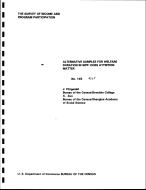Alternative Samples for Welfare Duration in SIPP: Does Attrition Matter
Alternative Samples for Welfare Duration in SIPP: Does Attrition Matter
Abstract
The survey of Income and Program Participation (SIPP) has been an important tool for studying how long people stay on welfare programs (i.e., welfare durations) because it has monthly data on use of various welfare programs. This paper focuses on the impact of alternate treatment of sample attrition when defining spells of welfare receipt by unmarried mothers. The analysis compares a sample that excludes those who miss an interview to one that does not exclude such cases. The latter sample is 60 percent larger. The comparison is based on non-parametric estimates of the probability of remaining on welfare at specified intervals (the survivor function) and hazard models with covariates reflecting the recipient personal characteristics (age, race, education, and children) and policy variables (AFDC benefit levels and unemployment rates). The comparison shows that, while attrition affects sample means, conditional estimates from behavioral models are less affected. The paper concludes that attrition may not be a large problem for welfare duration models using SIPP. The paper also compares samples with and without imputation and finds little difference.
Others in Series
Working Paper
Working Paper
Working Paper




